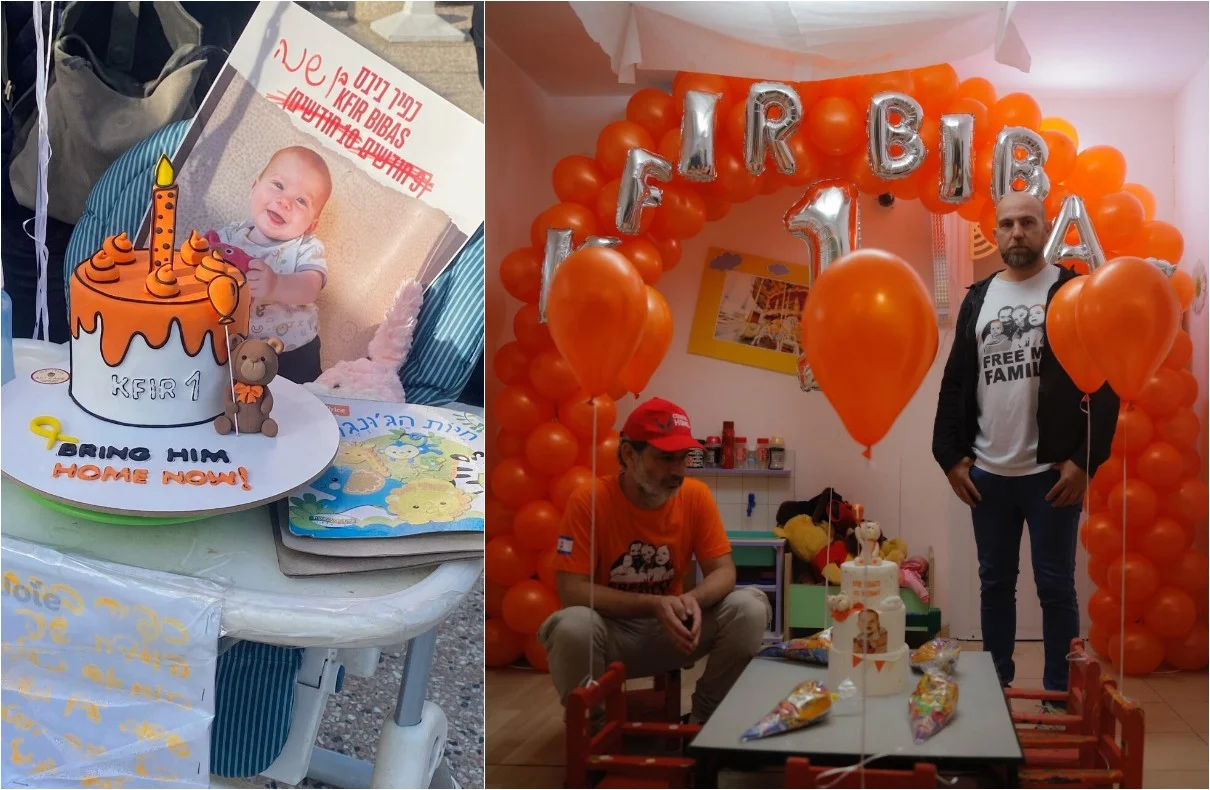
In the heart-wrenching story of Kfir Bibas, the youngest Israeli held hostage in Gaza, his first birthday becomes a painful reminder of the three months he has spent in captivity. While most babies his age are experiencing the joy of discovering the world around them, Kfir has been confined to darkness and uncertainty. As the Bibas family and their supporters gather to mark this bittersweet occasion, the world watches, hoping for a resolution to the ongoing trauma of the Bibas abduction.
Kfir Bibas, along with his parents Shiri and Yarden, and his older brother Ariel, were kidnapped on October 7, when Hamas attacked Israel, leaving a trail of devastation in its wake. The attack claimed the lives of 1,200 people and resulted in the abduction of approximately 250 individuals. The Bibas family found themselves caught in the crossfire, their lives forever altered.
Kfir’s bright red hair and infectious toothless smile have become a symbol across Israel, representing the helplessness and anger felt over the 136 hostages still held captive in Gaza. As his first birthday approaches, the nation gathers to show solidarity and raise awareness for their plight. The color orange, inspired by Kfir and Ariel’s hair, adorns the crowds, serving as a poignant reminder of the Bibas family’s struggle.
Biden Administration Dodges Pressuring Israel on Gaza Bombings
As hundreds of people gather in Tel Aviv to commemorate what has been dubbed “the saddest birthday in the world,” the emotions are palpable. Performances by Israeli children’s music stars and the release of orange balloons with heartfelt birthday wishes fill the air. However, for some relatives, the color orange brings with it both hope and pain, as they reflect on the birthday party that could have been, with balloons of every color.
The Bibas family’s home in Kibbutz Nir Oz serves as a testament to their unwavering determination. Relatives cover bullet holes and spattered blood from the attack with orange balloons, transforming the remnants of tragedy into a celebration of hope. In solidarity, the Israeli President, Isaac Herzog, displays a photo of a smiling baby Kfir as he addresses the World Economic Forum in Davos, Switzerland, urging international leaders to take action.
With two children held hostage against all laws of war, the Bibas family’s relatives and supporters raise their voices, calling on the Israeli government and international leaders to secure the release of all 136 hostages. Their pleas echo through the streets, questioning the silence of world leaders and demanding justice for the innocent lives caught in the grip of terror. The Bibas family’s relatives refuse to accept anything less than the freedom of their loved ones.
The Bibas family’s story is one of heartbreak and unimaginable loss. Kfir and Ariel, once carefree babies, now face a reality filled with fear and uncertainty. Their lives have been disrupted, their innocence shattered. The last time their cousin Tomer Keshet saw Kfir, he had just learned to crawl, and they held him close, unaware of the dark path that lay ahead.
Miller and Shnaider, first cousins of Shiri Bibas, have become familiar faces in the fight for justice. Clad in orange shirts symbolizing the bright hair of their young cousins, they tirelessly rally the crowds, leading chants of “Achshav” (Now!) in response to the call to bring the hostages home. While they appreciate the empathy they receive, they long for action and tangible results.
Woman Holds on to Speeding Car to Rescue Stolen French Bulldog
As the days turn into months, the Bibas family finds themselves in a state of shock and inertia. They have met with actors, famous personalities, and thinkers who express empathy for their situation, but the lack of progress leaves them feeling helpless. The family’s immediate members have less energy to stand on stage and shout, but their resolve remains unyielding. They demand action, urging the government to listen to the public’s plea to bring their loved ones home.
The Bibas family’s story has garnered international attention, with invitations pouring in from around the world. The tale resonates with people worldwide, who are moved by their plight. Yet, the family understands that telling their story is not enough. They continue to raise their voices, demanding a change in the status quo, and urging the world to acknowledge the violation of international laws and the abduction of innocent babies from their homes.
As the Israeli government deliberates on the fate of the hostages, the responsibility lies with Prime Minister Benjamin Netanyahu. The Bibas family, along with their supporters, implore him to take decisive action. Lives hang in the balance, and time is running out. The hostages cannot survive without a resolution, without a deal that secures their freedom.
Amidst the darkness and despair, a flicker of hope endures. The world watches, waiting for justice to prevail and for Kfir, Ariel, Shiri, and Yarden to be reunited with their loved ones. The saddest birthday in the world serves as a rallying cry, a reminder that every life deserves freedom and the chance to celebrate milestones. As orange balloons fill the sky, they carry with them the collective hope of a nation and the determination to bring the Bibas family home.
